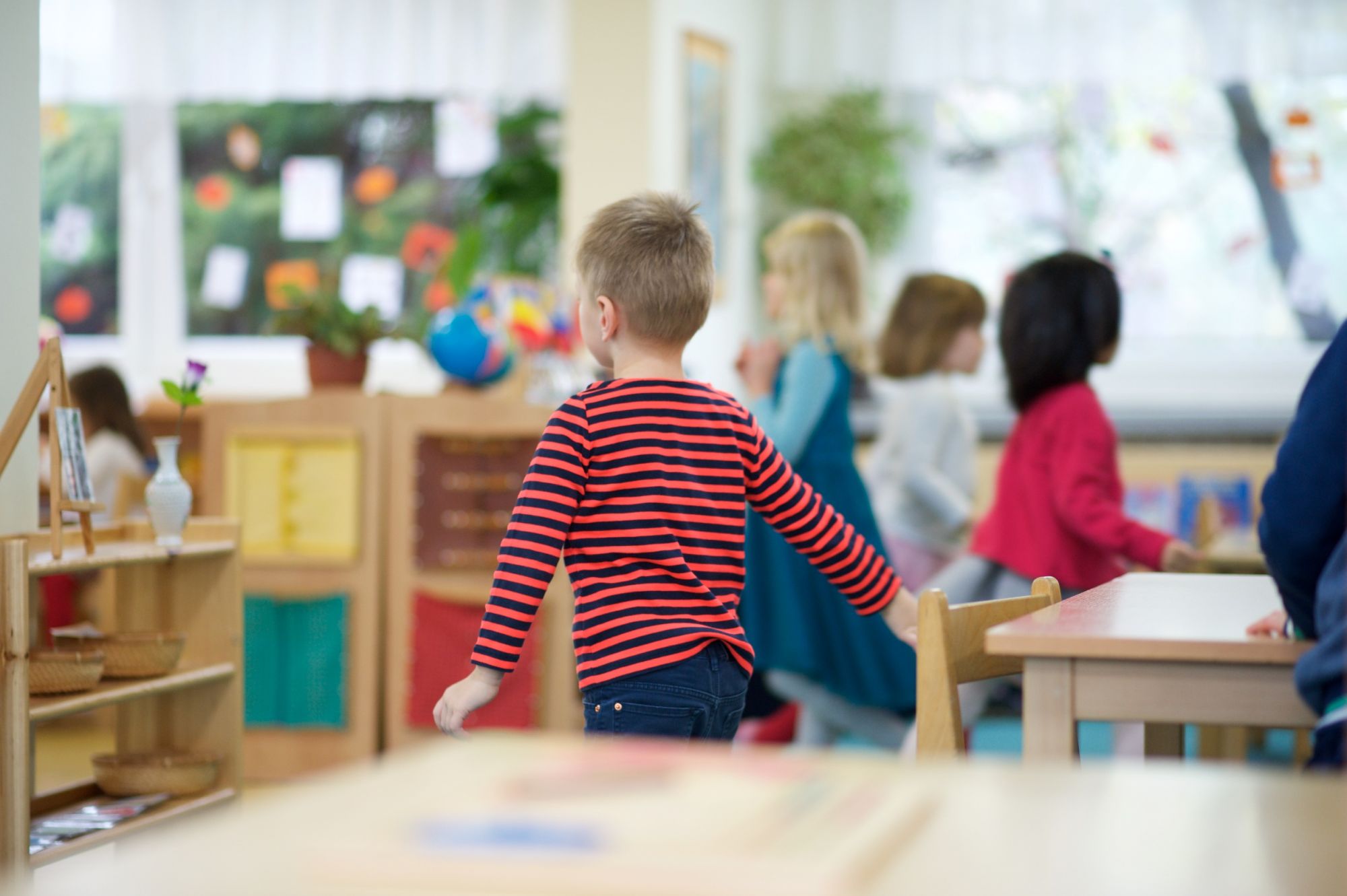Starting School

Beginning school attendance is a big milestone for children – and sometimes even more so for their parents. Just like any other big transition, realistic expectations and good preparation make all the difference in meeting this important challenge.
Whether your child is heading to first grade or just beginning in an Infant Community, there are concrete, simple steps you can take to ensure your child’s first (and following) days at school are as successful as possible. Below, you will find advice that applies to any classroom as well as specific information aimed at the Infant, Casa and Elementary years; whilst it’s based on teaching experience in Montessori settings, I have no doubt much of it applies to other educational systems as well.
All Ages
Congratulations! You have found the perfect school and couldn’t be more excited about the wonderful adventure your child is about to begin. You know they will do great things and cannot wait to watch their next steps in becoming the person they are meant to be.
Ideally, this would be a perfect description of your emotional state as your child starts school. If it’s not – well, fake it till you make it! Your child will look to you for clues on what is about to happen to them, and it’s going to make a world of difference if your attitude is confident and happy rather than fearful or pained. This really applies to children of all ages – don’t underestimate the emotional intelligence of a one-year-old in picking up on their parents’ thoughts and feelings.
It’s normal to be anxious or sad when your child heads to school; it’s a new chapter in their life, another sign of them growing up. If you need a shoulder to cry on because your little baby is suddenly a kindergartner, please, find one; if you need to do some research to beat the initial anxiety, well, welcome to this article! But when you’re saying goodbye to your child on their first day, they need you to be certain: this is a good and exciting thing they’re about to do.
Aside from that, you should:
- Get to know your school. Attend the parent orientation, read the welcome packet, meet with your child’s teacher. If you can’t make it to an orientation event due to other commitments, reach out to your school – chances are, they will be happy to make alternate arrangements. And if there is important information to share about your child, please do so before the excitement (and chaos) of first day.
- Figure out your tactics. Being on time is important, as is starting the day relaxed and confident. We highly recommend doing several test-runs of the new routine – wake-up time, washing and dressing, meals and commute – before the first day of school. If you need more time, a different route, or whatever else, it’s best to find out in advance, in a no-pressure setting. Pick up is usually a far less fraught situation than going to school; still, the same general advice applies.
- Don’t underestimate the body. In order for a child to be at their best emotionally and mentally, they need to be at their best physically. Make sure your child is well rested – if they need to adjust to a new bedtime and wake up time for school, start the new sleeping habits at least a week before school starts. And make sure your child is well fed: prioritize a good breakfast, and if you’re packing snacks or lunch, try to choose foods that are nutritious and that your child enjoys eating.

Explore the fundamentals of Montessori parenting with this free video by Sylvia Arotin, offering insights and strategies to empower and educate your child.
Infant Community (0-3 years)
The key topic when starting school during the early years is the emotional bond between the child and parent, and the child’s reaction to the physical separation when at school. Paradoxically, small children – babies and younger toddlers – tend to react rather smoothly to the new environment: as long as they feel safe and taken care of, they usually accept the change easily. Older toddlers will probably need more support, and time, to settle into their new routine. As a parent, you should expect the challenges of transition to show themselves outside of school as well; depending on your child’s personality and developmental stage, they might become clingy, attention seeking, grumpy, or oppositional. All of this is normal, and all of this will pass!
- Give a short and sweet goodbye. This is the first thing I tell all parents as a classroom teacher: when your child comes to school, don’t prolong the goodbyes. A confident and brief parting – a kiss, a high five, a “can’t wait to see you later!” can make all the difference between a protracted, tearful separation or a toddler walking into the classroom in comfort and good cheer.
- Starting school is a big change; if possible, time the beginning of school to avoid any other significant changes to your child’s life within the first several weeks of attendance. Try to built as much consistency in your child’s life as possible: from the morning to naptime to weekend activities, predictable events will make your child feel safe and confident.
- Spend quality time together. The old adage of “quality over quantity” applies, especially when starting school means a significant decrease of the time your child spends with you. Whether it’s play time, snuggles, walks or chores, make sure to spend some time fully focused on your child each day. We strongly recommend turning your phone off for this one.
Casa (3-6 years)
The Casa years mark the transition from what Dr. Montessori called “the unconscious explorer” and the “conscious learner”. In the Infant Community, the children usually view their teachers as akin to extended family, and the classroom as just another exciting place to play; in the Casa, they begin to form their conscious identity as students, and begin to consciously strive towards knowledge and perfecting their skills and abilities. The importance of their peer group also skyrockets: they form friendships and their interactions shift from parallel play and observation to direct cooperation.
- Respect your child’s classroom as their “workplace”. They are trying on a new social role, and forming a new identity, one which you are not directly part of. Whilst some Montessori schools invite parents to come into the Infant Community, virtually none will welcome them in Casa, and for good reason.
- Give your child time and space to process the transition. You should expect that the mental and emotional transition to the new environment takes, on average, about eight weeks of continuous attendance; your child may walk in with a smile one week and tearfully protest going to school the week after. Stay calm and patient, and if you have any concerns regarding the classroom, discuss them with the teacher out of your child’s earshot.
- Know that it might be difficult for your child to verbalize their experiences. Although at three and older, children usually have a sizable vocabulary, they often find it difficult to answer the eager question – “what did you do at school today?” Over the years, some of the most common answers I have witnessed as a teacher are: “I ate snack”, “we played outside”, or the ever popular: “nothing”. When they’re with you, let your child focus on the present and be with you mentally as well as physically: talk about the weather, your dinner plans, which playground to go to. You can lead the way by telling them anecdotes about your own experiences during your time apart, if you’d like. Your child will share with you when they’re ready.
Elementary (6-12 years)
The Montessori Elementary classroom is a place of great independence and freedom – coupled with great responsibility. The children are expected to organize their time, select work, set and meet their own goals. Rather than any academic work, the best preparation your child can have is building the habits and attitude of a reliable, confident and self-sufficient student.
- Empower your child to have ownership of their studies. An Elementary student should have a comfortable workspace, a calendar, an alarm clock; they should be responsible for packing their bag, completing their work, doing their readings. As a parent, they need you to be interested and involved in their studies, but not do these tasks for them. If in doubt where the line lies at your child’s developmental level, I highly recommend discussing this with their teacher.
- Give personal and family responsibilities. Your child is an active and involved participant in their school life and they should have the same at home. Whether it’s taking out the trash, preparing breakfast or making beds in the morning, assigned chores will help your Elementary student feel grounded, accomplished and appreciated, bringing a proven positive impact on their school attitude as well.
- Protect unstructured free time. Your child will do demanding academic work at school, with periods of deep concentration, research and rote practice. Equally important for their development is also time to rest, explore, and imagine; whether it’s running around the playground, drawing or playing with legos, a portion of your child’s day should always be free of demands and external stimulation.
- Read together. Over and over again, we are learning that family reading time and the resulting relationship with books helps children in every possible measurable area, from academic performance to social skills. Whether it’s you reading to your child or them reading to you, this simple family activity is some of the most beneficial things you can do together.
Montessori Beginnings
YOUR ULTIMATE
MONTESSORI PARENTING COURSE
FOR ZERO TO THREE
Gain clarity and confidence in your parenting to raise a resilient, independent and joyful child.


